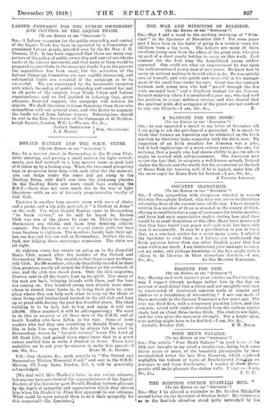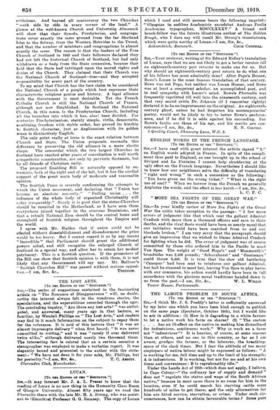THE SCOTTISH CHURCH EN'ABLLITO BILL. *
[TO THE EDITOR OP THE " SPECTATOR.")
Sin,—May I be allowed a rejoinder to Dr. Gordon Mitchell's second letter (in the Spectator of October 11th)? My statements as to the Scottish situation stand quite untouched by his criticisms. And beyond all controversy the two Churches " work side by side in every corner of the land." A glance at the well-known Church and University Almanack will show that their Synods, Presbyteries, and congrega- tions cover exactly the same ground from the far Shetland Isles to the Solway. from the Western Hebrides to the Tweed, and that the number of ministers and congregations is almost exactly the same. The reason is that the leaders of the Free Church of Scotland in 1843 and their followers declared they had not left the historical Church of Scotland, but had only withdrawn as a body from the State connexion, because they held that the State had infringed upon the sacred rights and duties of the Church. They claimed that their Church was the National Church of Scotland—free—and they accepted responsibility for every part of the country.
To my mind that Church has the best claim to be considered the National Church of a people which best expresses their characteristic religions genius and history. A legal alliance with the Government is most desirable. Yet the French Catholic Church is still the National Church of France, although not now Established. In Scotland the National Church, in this sense, is the Presbyterian Church, including all the branches into which it has, alas! been divided. For centuries Presbyterianism, sternly simple, virile, democratic, combining freedom with stable order, has proved its kinship to Scottish character, just as Anglicanism with its golden mean is distinctively English.
The only point really at issue is the exact relation between Church and State. The Union proposals reconcile this difference by preserving the old alliance in a more elastic shape. The concordat which the two largest Churches in Scotland have reached after years of consultation is well worth sympathetic consideration, not only by patriotic Scotsmen, but by all friends of Christian unity.
The proposed Enabling Bill is naturally opposed by ex- tremists, both of the right and of the left, but it has the cordial support of the great main body of moderate and reasonable opinion. The Scottish Press is severely condemning the attempts to wreck the Union movement, and declaring that " Union has become an absolute necessity." " Failing union . . the influence of the whole body of organized Christianity will suffer irreparably." Surely it is good that the sister-Churches should be reunited in the Motherland, as I have seen them everywhere joined together in the overseas Dominions, and that a rebuilt National Zion should be the central home and stronghold of Scottish religion throughout the Empire and the world.
I agree with Mr. Heiden that if union could not be effected without disestablishment and disendowment the price would be too heavy. But I cannot regard it as by any means " incredible " that Parliament should grant the additional powers asked, and still recognize the enlarged Church of Scotland in a special way, and allow her to retain her modest patrimony. This is a Scottish question. If the promoters of the Bill can show that Scottish opinion is with them, it is not likely that any Government will say nay. Mr. Balfour's " Scottish Churches BilI" was passed without serious opposi-







































 Previous page
Previous page